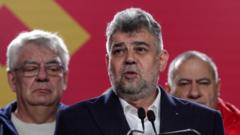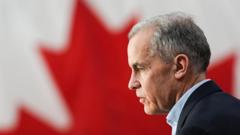As Canadian politics experiences significant upheaval following Prime Minister Justin Trudeau's announcement to resign, Mark Carney, a distinguished former governor of the Canadian and British central banks, has declared his intention to lead the Liberal Party. Carney's announcement comes as the party faces substantial challenges, including a dramatic lead by the Conservative opposition in opinion polls. He emphasized the need to address various national issues and positioned himself as an outsider, distancing his campaign from Trudeau's contentious record.
Mark Carney Enters Race for Liberal Leadership Amid Political Unrest

Mark Carney Enters Race for Liberal Leadership Amid Political Unrest
Mark Carney, former central banker, announces candidacy for Canadian Liberal Party leadership as Justin Trudeau steps down.
Carney, at 59 years old, made his candidacy official on January 16, 2025, in Edmonton, Alberta. He expressed his commitment to earning the support of Canadians while acknowledging the country's evolving challenges. "My generation of Canadians is lucky," he remarked, reflecting on a prosperous past. "But those good old times...are over. Our times are anything but ordinary.” This sentiment underscores the shifting political landscape as many Canadians express disillusionment with the country's current trajectory under the Trudeau administration.
Trudeau's impending departure marks the end of nearly a decade in power, a period that has seen his global prominence diminish significantly. His tenure leaves behind a party struggling to maintain relevance, particularly as recent polls indicate that the Conservative party holds a significant edge, leading the Liberals by over 25 percentage points. The mounting issues Canadians face—rising housing costs, strained healthcare systems, and increasing living expenses—contribute to this growing discontent among voters.
Carney, who served as an informal economic advisor to Trudeau during the COVID-19 pandemic, is trying to establish himself as a fresh candidate unburdened by the prior administration's controversies. His focus on green investments reflects a broader desire for innovative solutions to Canada's pressing challenges, and he aims to unify a fragmented party and reassure the public as they head into national elections this year.
Trudeau's impending departure marks the end of nearly a decade in power, a period that has seen his global prominence diminish significantly. His tenure leaves behind a party struggling to maintain relevance, particularly as recent polls indicate that the Conservative party holds a significant edge, leading the Liberals by over 25 percentage points. The mounting issues Canadians face—rising housing costs, strained healthcare systems, and increasing living expenses—contribute to this growing discontent among voters.
Carney, who served as an informal economic advisor to Trudeau during the COVID-19 pandemic, is trying to establish himself as a fresh candidate unburdened by the prior administration's controversies. His focus on green investments reflects a broader desire for innovative solutions to Canada's pressing challenges, and he aims to unify a fragmented party and reassure the public as they head into national elections this year.























